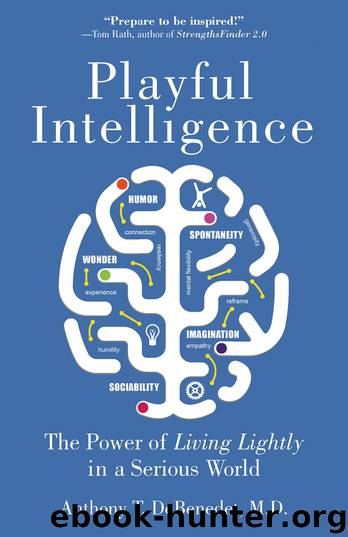Playful Intelligence: The Power of Living Lightly in a Serious World by Anthony T. DeBenedet

Author:Anthony T. DeBenedet [DeBenedet, Anthony T.]
Language: eng
Format: epub
ISBN: 9781595807939
Publisher: Santa Monica Press
Published: 2018-05-01T03:00:00+00:00
Charlie Chaplin once said, “To truly laugh, you must be able to take your pain and play with it.” Like Brenda, most of the playfully intelligent people I have spoken with for this book use their senses of humor not only to connect with others, but also to cope with stressful situations or experiences. Vivienne and Dan certainly did. In the playfully intelligent mind, humor isn’t necessarily called upon for every difficulty that is encountered—it isn’t a default coping mechanism, in this sense—but it is something that can be consciously called upon, in various capacities, when needed. That’s not to say humor always works (to strengthen a connection or get us through a rough spot). In fact, in many ways, humor is like a medication that only works some of the time. But if you never think about what it could do—it will never have a chance to do anything.
It’s important to note that, in my interviews, I did not observe humor being used as a way to escape or avoid challenges at hand. Brenda fully suffered the painful emotions and grief that came with her rectal cancer journey. She didn’t use humor to blow off her reality. She used it as a way to gain a little air and control in a situation that felt very much out of her control.
Humor theorists hypothesize that this is precisely the mechanism through which humor provides us with resiliency. When we are able to laugh or find humor amid stress, we give ourselves a psychological distance from the situation that turns out to be incredibly powerful. By placing ourselves in an observant role, standing beside our pain, we can look at it from a lighter point of view. The key is that this distance is never very far. We aren’t running away from our stress. We are standing next to it. We aren’t denying the trauma of the adversity itself. We are using humor to improve the emotions and psychology that surround it.
In the laboratory, simulating stressful experiences for study subjects and then measuring their responses has been a popular model used to study the humor-resiliency link. It’s somewhat distressing to think about this kind of research actually taking place, with participants usually watching stressful videos, working on unsolvable math problems, or being told (falsely) that they are going to receive a small electric shock. But what has been found is that those participants with higher levels of humor or those who create humor narratives for what they’re doing or watching usually experience less stress.
So, how well does the humor-resiliency link hold up in real life, outside the laboratory? Considerable research on this question has been conducted on prisoners of war as well as Nazi concentration camp survivors. One study evaluated crewmembers of the USS Pueblo shortly after they were released from a North Korean prison in 1969. Better psychological adjustment was correlated with the use of humor. The prisoners noted that joking about the characteristics of the prison guards, using humorous
Download
This site does not store any files on its server. We only index and link to content provided by other sites. Please contact the content providers to delete copyright contents if any and email us, we'll remove relevant links or contents immediately.
The Art of Thinking Clearly by Rolf Dobelli(10454)
Mindhunter: Inside the FBI's Elite Serial Crime Unit by John E. Douglas & Mark Olshaker(9320)
Change Your Questions, Change Your Life by Marilee Adams(7759)
Nudge - Improving Decisions about Health, Wealth, and Happiness by Thaler Sunstein(7692)
Mastermind: How to Think Like Sherlock Holmes by Maria Konnikova(7323)
The Power of Now: A Guide to Spiritual Enlightenment by Eckhart Tolle(5752)
Men In Love by Nancy Friday(5234)
Altered Sensations by David Pantalony(5093)
Factfulness: Ten Reasons We're Wrong About the World – and Why Things Are Better Than You Think by Hans Rosling(4733)
The Confidence Code by Katty Kay(4251)
Thinking in Bets by Annie Duke(4218)
Man and His Symbols by Carl Gustav Jung(4130)
The Worm at the Core by Sheldon Solomon(3486)
Why Buddhism is True by Robert Wright(3446)
Liar's Poker by Michael Lewis(3441)
Three Women by Lisa Taddeo(3422)
The Inner Life of Animals by Peter Wohlleben(3310)
Descartes' Error by Antonio Damasio(3270)
How Music Works by David Byrne(3259)
